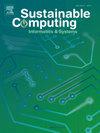支持区块链的物联网框架,具有节能的机器学习,可扩展和安全的智能城市
IF 5.7
3区 计算机科学
Q1 COMPUTER SCIENCE, HARDWARE & ARCHITECTURE
引用次数: 0
摘要
在快速城市化的环境中,城市已经变成了复杂的生态系统,需要复杂的技术解决方案来解决过度的交通、能源利用、废物管理和公共安全问题。本研究通过使用区块链支持的安全性、节能机器学习、实时分析和决策来克服智能基础设施中普遍存在的可扩展性、互操作性和安全性问题,讨论了支持物联网的智慧城市的单一架构。该框架利用基于轻量级算法的成本效益计算、异构物联网设备的集成、实时决策、透明度和利益相关者的参与。仿真结果显示了与传统方法相比的实质性优势:处理延迟降低了35% %;能源消耗降低25% %;数据安全指数提高了29% %。此外,预测分析在不同的城市环境中显示出超过90% %的识别准确率,包括改善公共安全的交通控制,以及确保可靠预测事件和适当资源分配的环境监测/管理场景。区块链模块演示了交易验证时间的中位数小于2 毫秒,以验证物联网数据流,即使在苛刻的环境条件下也能实现实时安全操作。此外,我们还实现了资源分配的优化,在指定的优先供应品(包括食品、能源和医疗资源)上的效率超过85% %,并减少了浪费,提高了抗灾能力。该模型适用于不同的城市环境,是下一代智慧城市的可扩展、安全和节能框架,有助于可持续城市化和提高城市生活质量。本文章由计算机程序翻译,如有差异,请以英文原文为准。
Blockchain-enabled IoT framework with energy-efficient machine learning for scalable and secure smart cities
In a rapidly urbanizing environment, cities have changed into complicated ecosystems requiring sophisticated technological solutions to resolve excessive traffic, energy utilization, waste management, and public safety issues. This study discusses a single architecture for IoT-enabled smart cities through the use of blockchain enabled security, energy efficient machine learning, real-time analytics, and decision-making to overcome scalability, interoperability, and security issues generally present in a smart infrastructure. The framework utilizes lightweight algorithm-based cost-effective computation, integration of heterogeneous IoT devices, real-time decision making, transparency, and involvement of stakeholders. The simulation findings show substantial advantages over traditional methods: a 35 % decrease in processing latency; a 25 % decrease in energy consumption; and a 29 % increase in an index for data security. Also, predictive analytics exhibited over 90 % identification accuracy across the different urban contexts, including traffic control for improved public safety, and environmental monitoring/management scenarios that ensured reliable forecasted events and appropriate resource allocation. The blockchain module demonstrated median transaction validation times of less than 2 ms to validate IoT data streams enabling real-time secure operations even under demanding environmental conditions. Also, we achieved resource allocation optimization with efficiencies that exceeded 85 % for designated priority supplies, including food, energy, medical resources, and reduced waste and improved disaster resilience. This model is adaptable across different urban settings and is a scalable, secure, and energy efficient framework for the next generation of smart cities contributing to sustainable urbanization and improved quality of urban life.
求助全文
通过发布文献求助,成功后即可免费获取论文全文。
去求助
来源期刊

Sustainable Computing-Informatics & Systems
COMPUTER SCIENCE, HARDWARE & ARCHITECTUREC-COMPUTER SCIENCE, INFORMATION SYSTEMS
CiteScore
10.70
自引率
4.40%
发文量
142
期刊介绍:
Sustainable computing is a rapidly expanding research area spanning the fields of computer science and engineering, electrical engineering as well as other engineering disciplines. The aim of Sustainable Computing: Informatics and Systems (SUSCOM) is to publish the myriad research findings related to energy-aware and thermal-aware management of computing resource. Equally important is a spectrum of related research issues such as applications of computing that can have ecological and societal impacts. SUSCOM publishes original and timely research papers and survey articles in current areas of power, energy, temperature, and environment related research areas of current importance to readers. SUSCOM has an editorial board comprising prominent researchers from around the world and selects competitively evaluated peer-reviewed papers.
 求助内容:
求助内容: 应助结果提醒方式:
应助结果提醒方式:


